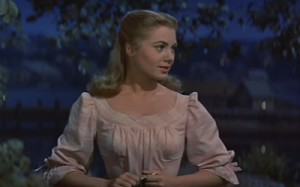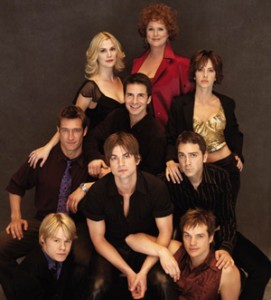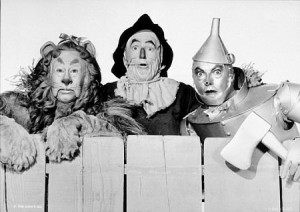What do all the characters above have in common?* Nothing seems to link them, until you realize that they’ve all been described by the same word — somewhat iconically or significantly in each case — but they each represent a different sense of the word at different stages of its lifetime, which has been fairly tumultuous.
If you were to try and identify one word that symbolizes how very pliant, dynamic and versatile our language is, queer might just be it. A fascinating word with a long and colorful history and usage (as an adjective, noun and verb), it dates back to the beginning of the 16th century, has undergone several transformations in its 400 plus years — especially in the last two or three decades, was in disgrace for a long while, and is now experiencing something of a renaissance or reclamation process that is as bold and controversial as its definition has ever been. What other word is recognized in such a variety of senses — from antiquated poetic (in Hardy and Dickens, eg.) to outlawed insult to legit hipster category?
The Online Etymology Dictionary dates the birth of the English word queer to about 1500, with its meaning (adj) of “strange, peculiar, eccentric” from Scottish, perhaps from the Low German queer meaning “oblique, off-center,” related to the German quer, meaning “oblique, perverse, odd,” in turn from the Old High German twerh, “oblique”.
During the course of the 18th century, it acquired a new and associated sense — still as an adjective — of “feeling out of sorts, unwell, faint, giddy”. Charles Dickens, in his Pickwick Papers of 1837, wrote queasily of “legs shaky — head queer — round and round — earthquake sort of feeling — very.” From the late 18th century on, queer has also been used as a verb: first meaning “to puzzle, ridicule or cheat”, and then later, from about 1812, changing to mean “spoil or ruin”, or “to jeopardize”.
By the turn of the 20th century, the word had acquired firm connotations of sexual deviance, especially referring to the behavior of homosexual or effeminate males, and it’s difficult to determine exactly when queer moved from this loose meaning of kinky, aberrant or dissolute to the more specific sense of homosexual. The Oxford English Dictionary identifies this as happening just after the turn of the century, citing a 1914 article in the Los Angeles Times that described a club being “composed of the ‘queer’ people”, where “the ‘queer’ people have a good time”. The OED also quotes Arnold Bennett in 1915 talking about “an immense reunion of art students, painters, and queer people. Girls in fancy male costume, queer dancing, etc.” In my opinion this seems more in keeping with the earlier, unspecific sense of the word, and the Online Etymological Dictionary bears this out by claiming (without actual citations) that the first real use of queer in the sense of “homosexual” (as an adjective) was recorded in 1922, with the related noun following soon after in 1935.
The next few decades were dark days for the five-letter word, when it was used predominantly as a derogatory adjective (and noun) for homosexual men and women, and it was slowly but surely consigned to the linguistic gutter as politically incorrect, insulting, or just plain taboo. However, queer‘s sense of eccentric or unorthodox did linger for a while longer through the first half of the 20th century, and the verb meaning “to ruin or spoil” endures to this day — if somewhat archaically.
It was during the late 1980s that the tide started to turn, and then began what could be described as queer‘s identity crisis out of which it hasn’t yet emerged. Not surprisingly it reflects the immensely complicated and subtle issues of sexual and gender identity that many of those people defined by the word — either by others or by themselves — have struggled with historically. It was towards the end of the 20th century that queer started its re-appropriation as a term of self-identification by gay activists, who wrested it from the shadows where it had lurked for so long as an anti-gay epithet. In 1990, the LGBT community — galvanized by a newly-formed organization called Queer Nation — famously began this overt process of reclamation by distributing a flier called “Queers Read This” at that year’s New York Gay Pride Parade.
Emerging from this period of partial rehabilitation, queer is now used by some as a descriptive umbrella term — usually as an adjective, and primarily in a neutral or even a positive sense — for sexual and gender minorities who do not identify themselves as heterosexual, hetero-normative, or gender-binary; it encompasses (but isn’t necessarily confined to) gay men, lesbians, bisexuals, and transgender people, and is used as a self-defining label actively and predominantly by a younger demographic. People who see themselves as this kind of queer are turning their backs on the conformist values of the gay mainstream and prefer the more unconstrained definition (or non-definition) of sexuality and gender.
The word has come to have strong socio-political overtones, as it is commonly adopted by activists and people who positively reject and might even feel oppressed by the traditional and distinct sexual identities that have been so dogged by prejudice over the decades. As is the case for so many re-appropriated words like it (see Glossophilia’s earlier post on this subject), queer remains an offensive insult to a large number of people to whom the modern catch-all might apply — especially when it’s used by heterosexuals. For older members of the LGBT community who remember the historically pejorative meaning of queer well, it can be associated with extreme political correctness or political radicalism, or is simply a piece of disagreeable slang used by a self-conscious youth movement, and is therefore best avoided.
Despite its current status as controversial or ambiguous and its long history as a derogatory expression, and perhaps because of its growing acceptance as a reclaimed word, queer has managed to find a prominent place in popular culture and keeps a presence in common phraseology (see below), so much so that the word now has its own hip abbreviation: “Q”.
Queer in popular culture:
Queer Eye (originally called Queer Eye for the Straight Guy): an American reality TV series from 2003, based on the premise or understanding that gay men are superior to their straight counterparts in matters of fashion, style, personal grooming, interior design and culture.
Queer as Folk (see below); originally a UK TV series, then an American series
Queer Duck: an American animated TV series, and the first animated series to have homosexuality as its predominant theme
Queer in colloquialisms or phraseology:
“There’s nowt so queer as folk”: a Northern English expression meaning that people sometimes behave in the strangest ways. Although completely unrelated to homosexuality, this is the phrase on which the title of the TV series Queer as Folk (see above) was based.
“To queer the pitch”: according to PhraseFinder, its original meaning was to interfere with or spoil the business of a tradesman or showman (and the Online Etymology Dictionary confirms this sense from 1846 referring to the patter of a tradesman or showman, as in a “sales pitch”), and more recently it has meant “to spoil the business at hand”. (As noted above, queer meant “to spoil” from the early 19th century.) The phrase “to queer the pitch” was first recorded in the vernacular speech of 19th-century London, in The Swell’s Night Guide, 1846: “Nanty coming it on a pall, or wid cracking to queer a pitch.”
“In Queer Street”: was used in the UK to describe someone in financial trouble, as noted in the 1811 edition of Francis Grose’s A Classical Dictionary of the Vulgar Tongue.
~~~~~~~~~~~~~
* The “queer” characters illustrated above are:
a) Julie Jordan: “You’re a queer one, Julie Jordan” is a song about the main character in Rodgers & Hammerstein’s musical Carousel (written in 1945), referring to her non-conformist and somewhat enigmatic personality:
“You’re a queer one, Julie Jordan
You won’t ever tell a body what you think.
You’re as tight-lipped as an oyster,
And as silent as an old Sahara spink”
b) The characters in Queer as Folk: the first hour-long drama on American television (it began in 2000) to focus on and portray the lives of gay characters, following the trials and tribulations of five gay men and a lesbian couple in Pittsburgh, Pennsylvania.
c) Dorothy’s friends: Polychrome (the rainbow’s daughter) remarks to the main character, Dorothy, in L. Frank Baum’s book The Road to Oz : “You have some queer friends, Dorothy.” (Her famous response is “The queerness does not matter, so long as they’re friends.”). I’ve often wondered why this isn’t offered as the origin of the euphemism “Friend of Dorothy” (or FOD) for gay people. Judy Garland, a gay icon (who famously portrayed Dorothy in the MGM movie The Wizard of Oz), and Dorothy Parker are usually cited as the names or explanations behind the expression.




Have a look at http://www.amazon.co.uk/dp/B002QIXFDI (and play the clip) for another familiar usage in the sense of ‘unwell’, or ‘queasy’.
Pingback: Done up like a kipper « Language « Glossophilia
Pingback: Some word-travel (or lack of it) in recent news « Words, Phrases & Expressions « Glossophilia